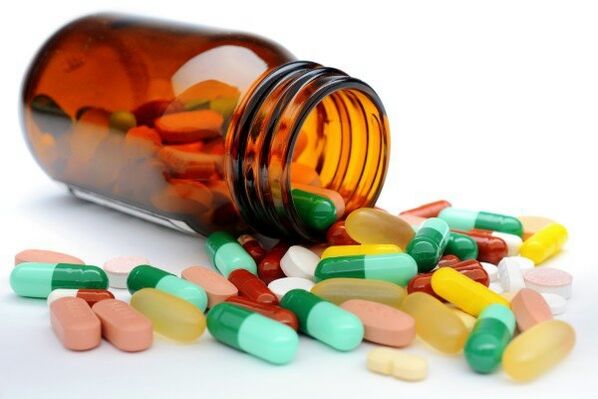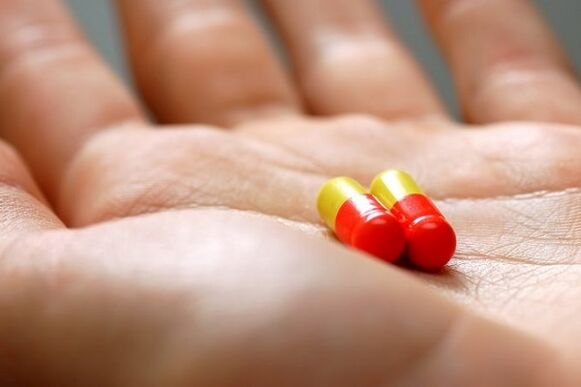Prostatitis problems should not be left without attention and proper treatment. The body is unable to cope with such a disease on its own. The complex of measures that will help with inflammation of the prostate includes the treatment of prostatitis with tablets.

Tablets can have general or targeted effects. It is not worth choosing from a large number of pharmacies yourself. There is a high probability that not only will not get the desired result, but there will also be side effects.
It is more correct to find a doctor who is knowledgeable about prostate health and follow their instructions. This saves your home budget and leads to faster results. After all, the main feature that distinguishes the treatment of prostatitis with antibiotics and pills is precisely the responsible and rational approach to the problem.
Taking pills for prostatitis
After examining the results of laboratory tests and direct examination of the prostate (and possibly the entire genitourinary system), the doctor will prescribe an appropriate therapy.
An integrated approach is more common. Among the drugs, depending on the stage of development of the disease, they can prescribe:
- Painkiller;
- Antispasmodics;
- Anti-inflammatory;
- Antibiotics;
- Antiviral drugs.
- Alpha blockers.
Often times, a specialist has to combine known drugs to achieve a result in the shortest possible time. The dosage is selected individually. It is influenced not only by the results of the clinical examination, but also by age characteristics, lifestyle, ability to inpatient treatment or its absence.

It should be remembered that during treatment you should forget about the use of alcoholic beverages. This doesn't just apply to antibiotics. All drugs lose their effectiveness in combination with a libation treatment and can lead to side effects due to the high stress on the liver.
Interruption of the therapy course should not be allowed. The more precisely the instructions of the attending physician are followed, the more effective the therapy. If the patient does not initially have a significant amount of money to spend on treatment, the choice of medication must be discussed with the urologist immediately.
The modern pharmacological market has a wide range of generic drugs (cheaper analogues of patented drugs) that do not differ in effectiveness from the tablets advertised.
Popular pills for prostatitis
- fluoroquinolone based;
- Containing penicillin;
- with macrolides;
- with tetracyclines.
Treatment of prostatitis with pills
When treating a patient with pronounced symptoms of pain, the doctor first prescribes analgesics that can relieve the pain. These are usually pain relievers. Many of them not only help relieve pain, but also relieve inflammation. Most often, this picture of appointments is typical of acute prostatitis.
If acute prostatitis is of the utmost concern and is not the result of an untreated chronic form, anti-inflammatory drugs can completely eradicate the disease in its early stages.

Most likely, they are prescribed in combination with antibiotics or antivirals. However, suppressing the development of the inflammatory process is the basis for the successful treatment of prostatitis.
Often times, inflammation of the prostate is accompanied by a painful contraction of the muscle tissue that makes up the prostate. In this case, antispasmodic tablets are prescribed. They improve blood circulation and help muscles relax, which reduces pain.
Notice!If there are problems with urination, drugs that reduce the tension in the urethra and bladder are needed. Muscle relaxants work well. They prevent the muscles from contracting painfully and make going to the toilet a lot easier.
Treating chronic prostatitis with pills may also require the use of alpha blockers. These drugs have a long course of administration and are prescribed because of difficulty urinating and urinary retention. Such therapy helps to control the process of enlargement of the prostate and significantly reduces the intensity of the manifestation of painful symptoms.
The bacterial form of prostatitis implies the mandatory treatment of prostatitis with tablets, which can have a targeted effect on the fight against pathogenic microorganisms.
Antibiotics can be administered intramuscularly as inpatient treatment. But more often they are prescribed in the form of tablets for internal use. This comes in handy for those who cannot afford long sick leave.
Conclusion
Antibiotics are an essential part of treating acute prostatitis. The chronic inflammatory process of the prostate caused by bacterial infection also implies antibiotic therapy.





























